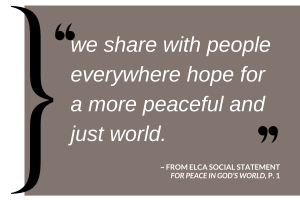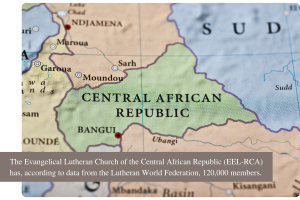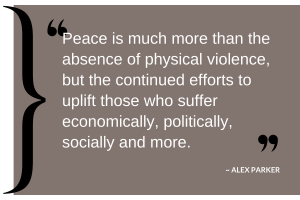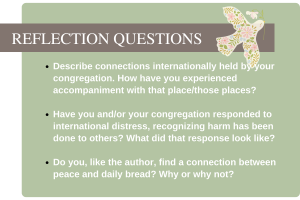By Alex Parker, ELCA Federal Policy Intern
The people of the Central African Republic (CAR) are in a period of unrest, currently facing a disastrous humanitarian crisis. Part of my job as the Federal Policy Intern with D.C.-based ELCA advocacy staff has been to advance our international policy priorities, including tracking ongoing developments in this nation. The more I learn, the more I ask: What can we do to support and accompany the people of CAR who seek peace?
 Adopted in 1995, the ELCA social statement For Peace in God’s World notes “we share with people everywhere hope for a more peaceful and just world.” Defining a word, we may take for granted, it “understands earthly peace to mean relationships among and within nations that are just, harmonious, and free from war. It offers direction as we act to keep and to build earthly peace…” (p. 1).
Adopted in 1995, the ELCA social statement For Peace in God’s World notes “we share with people everywhere hope for a more peaceful and just world.” Defining a word, we may take for granted, it “understands earthly peace to mean relationships among and within nations that are just, harmonious, and free from war. It offers direction as we act to keep and to build earthly peace…” (p. 1).
To be peace-directed is both direct and simultaneously unclear. We are drawn to action – to do something when we recognize harm being done to others. We are also called to pray – “In praying for peace in the world, in interceding for all who suffer from war and injustice and for those in authority, the Church acts for peace” (p. 3). But sometimes it is hard to feel like you can do something when conflict is so far away.
Daily Affronts to Peace
There are many examples in our daily lives that force us to face this responsibility to be peace-directed. We may witness violations of peace in our communities or current environments, and our commitment to peace encourages us to act through a variety of outreach programs, church groups and more.
And news filters to us from outside of our immediate community. How can we be active in confronting such conflict? What if abscissions of peace are having impact on communities that we may know little about?
Harms in the Central African Republic
 Since independence, CAR has experienced continuing episodes of violence amongst armed group rivalries and competing government forces. As a result, most of the harm has been inflicted on the civilian population. According to ReliefWeb International, the period between October 2022 and January 2023 saw more than 600 documented and verified human rights violations, as well as estimates of over 1.1 million people currently displaced (over a quarter of the population).
Since independence, CAR has experienced continuing episodes of violence amongst armed group rivalries and competing government forces. As a result, most of the harm has been inflicted on the civilian population. According to ReliefWeb International, the period between October 2022 and January 2023 saw more than 600 documented and verified human rights violations, as well as estimates of over 1.1 million people currently displaced (over a quarter of the population).
While the United Nations (U.N.) has deployed a peacekeeping force (MINUSCA) to CAR, the continued efforts have sustained ongoing challenges in fulfilling its goal of protecting civilians and disarming mobilized paramilitary forces. Lack of sufficient funding, unfulfilled infrastructure needs and religiously polarized violence have continued to plague ongoing international stabilization efforts.
This is further compounded by the Russian paramilitary Wagner group. President of CAR, Faustin-Archange Touadera, first elected in 2016, has worked with Wagner to make advances against various armed groups. With Wagner operating in several neighboring African countries that have followed autocratic trends, political opposition in CAR is fearful of a Russian-backed leadership imposition. Wagner increased their presence before a contentious referendum, which would allow Touadera to amend the constitution and prevent him from having to obey the two-term rule when his Presidency ends in 2024. On July 30th, the referendum was held with a supposed 95% of voters approving of the constitutional change amidst cries of corruption.
Current U.S. Response
Considering both the ongoing need for U.N. presence and the negative impact of foreign influences, it is critical that the U.S continue its support for humanitarian efforts in CAR. But, as Congress reconciles the differences between their budgetary operating bills, a lingering threat remains.
In the House version of the foreign affairs budget at this writing, humanitarian support, State Department funding and beneficial social programs that contribute to stabilization efforts in CAR are massively underfunded, and in some instances eliminated entirely. For example, the House version states that CAR is one of 28 countries which are not eligible for many of the programs it would fund (p. 90). As the FCNL notes, these slashed funds include the complete elimination of crucial programs such as the Atrocities Prevention Program, which provides funding for CAR communities to “form local peace committees that devise solutions to local and regional challenges.” The House proposal also eliminates U.S. funding – entirely – for the U.N. regular budget as well as several U.N. departments that would aid the people of CAR.
Present Church Activity
 “The Church is a disturbing presence when it refuses to be silent and instead speaks the truth in times when people shout out ‘Peace, peace,’ when there is no peace,” (p. 5) declares the ELCA social statement on Peace referencing Jeremiah 6:14. So, when the people of CAR shout out “peace” amid violent turmoil and humanitarian need, we as church must be present, even when the conflict seems so distant and complicated to address. We affirm the biblical insight of the “unity and goodness of created existence, the oneness of humanity, and the dignity of every person” (p. 7).
“The Church is a disturbing presence when it refuses to be silent and instead speaks the truth in times when people shout out ‘Peace, peace,’ when there is no peace,” (p. 5) declares the ELCA social statement on Peace referencing Jeremiah 6:14. So, when the people of CAR shout out “peace” amid violent turmoil and humanitarian need, we as church must be present, even when the conflict seems so distant and complicated to address. We affirm the biblical insight of the “unity and goodness of created existence, the oneness of humanity, and the dignity of every person” (p. 7).
The Evangelical Lutheran Church of the Central African Republic (EEL-RCA) has, according to data from the Lutheran World Federation (LWF), 120,000 members. LWF has multiple programs that train EEL-RCA leaders in peace values and conflict management skills. LWF also has used donations to support over 88,000 people in CAR, especially those who have been displaced, lack clean sources of water or are at risk of gender-based violence.
The ELCA Texas-Louisiana Gulf Coast Synod is a great model for how one might support the EEL-RCA. “It is our hope that every congregation will find some way of supporting the Lutheran Church of the Central African Republic (EEL-RCA),” it writes of this partnership “in hope.” They have a variety of programs supported through monetary contributions that prioritize medical clinics, women’s health, educational materials and more.
Continued Advocacy Efforts
As federal lawmakers begin to reconcile their versions of the foreign policy budget, we can pressure our representatives to pursue funding of humanitarian efforts, support for U.N. entities and ensure that our U.S. direct stabilization programs are not erased. Our Action Alert, “Support Humanitarian and Peacebuilding Programs in the International Affairs Budget,” is an opportunity to make your voice heard right now in this federal process.
 Through faith-based advocacy, social media, engagement with interfaith coalitions and using your voice, we can stive toward ending a conflict that damages the oneness and dignity of humanity. We cannot let this humanitarian issue fall to the wayside.
Through faith-based advocacy, social media, engagement with interfaith coalitions and using your voice, we can stive toward ending a conflict that damages the oneness and dignity of humanity. We cannot let this humanitarian issue fall to the wayside.
Peace is Presence Not Absence
As I have worked on understanding what is happening in CAR and thought about what peace means from a Lutheran perspective, I’ve found myself constantly going back to Martin Luther’s Small Catechism. In that work, Luther breaks down petitions of the Lord’s prayer and asks, “What then does ‘daily bread’ mean?” Answer: “Everything included in the necessities and nourishment for our bodies, such as food, drink, clothing, shoes, house, farm, fields, livestock, money, property, an upright spouse, upright children, upright members of the household, upright and faithful rulers, good government, good weather, peace, health, decency, honor, good friends, faithful neighbors and the like.”
The people of CAR need a daily bread that provides nourishment, safety and everything that culminates in a life of dignity. Peace is much more than the absence of physical violence, but the continued efforts to uplift those who suffer economically, politically, socially and more. We can share this bread with those who “shout out ‘Peace, peace’ when there is no peace,” no matter where in the world we are.
